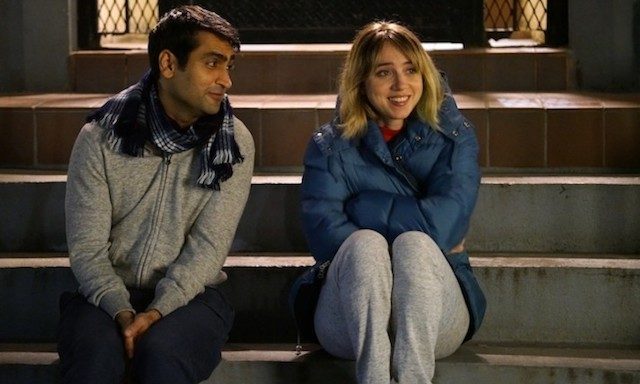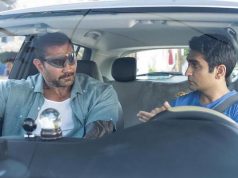
There’s a lot happening in “The Big Sick,” an autobiographical romantic comedy by Kumail Nanjiani (“Silicon Valley”) and Emily V. Gordon about the early days of their relationship. It’s a rom-com, complete with the trope where one party lies to the other, the discovery of which leads to a breakup. But it’s also a light drama about Kumail’s inner religious turmoil: he hasn’t told his parents that he no longer practices Islam and is dating a non-Muslim girl, but he’s led the girl to believe that he has.
Most rom-coms arrive at this point in the story at around the 90-minute mark. But Kumail (playing a version of himself) and Emily (played by Zoe Kazan) break up at about 40 minutes, immediately after which Emily becomes deathly ill and is put into a medically induced coma, leaving Kumail to deal awkwardly with her parents, Beth and Terry, whom he has never met and who know their daughter just dumped him.
The mom is Holly Hunter, too. Can you imagine having Holly Hunter mad at you?
It’s a very funny and authentic film, with effective drama that gives it weight but doesn’t weigh it down, directed by the increasingly mature Michael Showalter (“Hello, My Name Is Doris”). Kumail, a Pakistani immigrant trying his luck as a stand-up comedian in Chicago, is torn between his secular life and his good-naturedly old-fashioned parents (Anupam Kher and Zenobia Shroff), who intend to arrange a marriage for him with an eligible Muslim girl. That aspect of the story — which at first seems like the focus — takes a backseat to Emily’s medical crisis; the medical crisis, in turn, adds depth to the religious conflict, the experience helping Kumail crystallize his feelings and make a decision.
Nanjiani and Kazan have good romantic and comedic chemistry, but she’s absent from much of the film. More crucial is the interaction between him, Hunter, and Ray Romano, who plays Emily’s father (and is fantastic, by the way, a reality-based version of his sitcom persona). This relationship, clumsy at first, develops into understanding and affection as Kumail, Beth, and Terry, get to know each other, with Kumail using humor as a tension-breaker. They bond over an incident at a comedy club where Kumail is heckled by a Muslim-hater, awakening Beth’s mama-bear instincts. (Again: I do not want to be on the wrong side of Holly Hunter.)
As you’d expect from a true story, there are numerous touches that feel painfully or charmingly authentic. One is when Beth and Terry first get to town and Kumail takes them to Emily’s empty apartment, sensing the strangeness of being there without her as they see her belongings and associate memories with them. Another is how, as Kumail and Emily’s romance blossoms, she starts pronouncing “Pakistani” the way he does (“pock,” not “pack”), a subtle detail that means a lot.
The only real problem with the film, oddly, is Nanjiani: he’s too old to play this version of himself. He and Gordon got married 10 years ago, when he was 29. The film is set in the present, with Kumail in his late 30s, but it still has him acting like someone in his late 20s: slovenly apartment, slacker roommate, directionless existence, and so forth. His traditional Shia parents try to marry him off the way they probably did back then, not with the panicked intensity they’d surely have if their son were still a bachelor at almost 40.
But we shouldn’t ding Nanjiani and Gordon too hard for sticking to the story as it actually happened; in almost every other respect, the honesty is a boon to the film. The romantic comedy, the religious struggle, and the medical drama blend and overlap with the bumpy harmony that can only be found in real life.
B+ (2 hrs.; )





